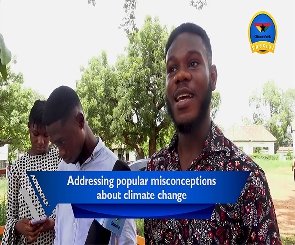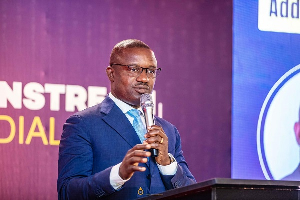Climate change has been described by experts as the crisis of our time. Its effect has got world leaders, religious leaders and everyone echoing a healthy climate.
Annually, the United Nations (UN) commits over $100 billion to finance and facilitate projects on educating the world on climate change, and to develop new climate adaptation mechanisms to safeguard humanity from the harsh effects of climate change.
Despite the efforts of the UN, other climate advocacy groups and governments across the globe to educate the world on climate change, many people do not believe in the reality of climate change. A study conducted by Pew Research Center; a renowned American digital platform noted for publishing works on social policy revealed that, People in Russia (43%), Nigeria (41%) and Israel (38%) are only the ones who believe in the reality of climate change. The report revealed same notion is held in most Sub-Saharan nations.
Many people reject the idea of climate change because of the views they hold on climate change and the misconceptions they have about climate change. A popular misconception on climate change is that, it is a hoax pushed by the political and elite class for their parochial interests. A famous believer of this theory is former US president Donald Trump, who in a tweet wrote, “The concept of global warming was created by and for the Chinese in order to make US manufacturing non-competitive”.
Sample of opinions among students of University of Ghana
An exercise conducted by GhanaWeb among some students of the University of Ghana disclosed that most people believe that climate change is not an issue of concern now.
This is because, they believe the effects of climate change on society can really be felt in the distant future. Others believe that nature’s course cannot be averted and managed by mankind, as such if climate change is real, what will happen will happen.
Avoid fatalistic approach to tackling climate change – Prof. Kwadwo Owusu
Responding to the misconceptions shared by the students on climate change, Professor Kwadwo Owusu, the Director of the Centre for Climate Change and Sustainability, warned against taking a fatalistic approach to tackling climate change.
“In tackling climate change, we have to move away from a fatalistic tendency and society. So being fatalistic means that we don’t look at the effects of things in the scientific prism and that we leave everything to God. So if you take that point of view, then there’s no need to take any action because what that means is what will happen will happen.”
He called on people who look at the issue of climate change from that perspective to revert to science.
He said, “So my advice to such people is to revert to science. The scientific evidence is that, climate has change and it is probably or most likely the work of man and it is because we have emitted a lot of gases known as greenhouse gases that have gone into the atmosphere. So the science has accepts that you cannot just flick a magic light on and the climate change problem is gone but through concerted efforts and doing things right in the course of time we can correct some of the damages to the environment.”
Do not rely on feelings and religion but science – Prof Owusu
The professor cautioned against relying on feelings, religion and politics to decide if one would accept the reality of climate change.
He explained, “Three years ago, there was probably about three rains in June in Accra, but that person who says, when he was young the climate was the same, go back, it would take centuries, June would always be wet. So the evidence is there, if you want to deflect the evidence with religion and believe you can do that. In Ghana, the way we analyze the climate is sometimes about feelings, and not about the science.”
He added, “the skeptics who tell you that the climate was the same when they were young, how do they know that? What measurement have they taken to see that? Is it about feelings or science? We must focus on the science.”
Although many dismiss climate change and believe human actions are powerless, Climate change is a global crisis that demands our attention and collective action.
This report is produced in fulfilment of the UNESCO & CIJ London Climate Change in News Media project facilitated by the Centre for Journalism Innovation and Development".
Watch the video below:
You can also watch some climate change interviews done by GhanaWeb below:
Writer: Elliot Nuertey
General News of Monday, 29 May 2023
Source: www.ghanaweb.com

















